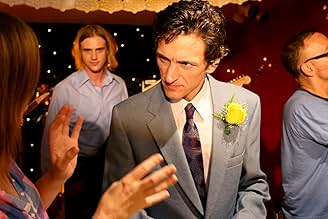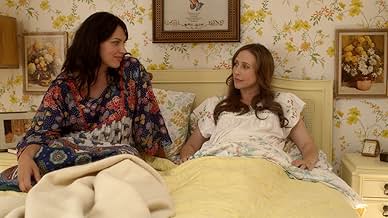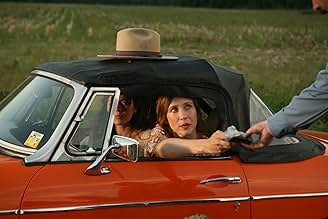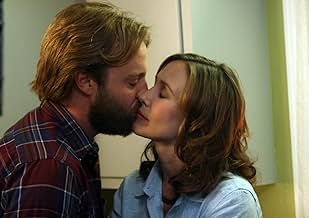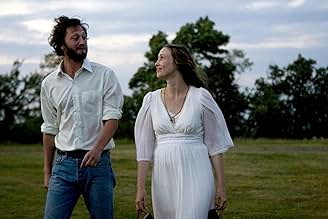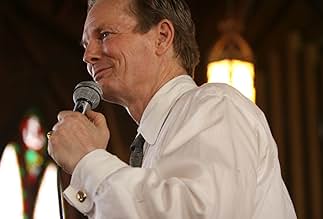NOTE IMDb
6,2/10
3,4 k
MA NOTE
Ajouter une intrigue dans votre langueA chronicle of one woman's lifelong struggle with her faith.A chronicle of one woman's lifelong struggle with her faith.A chronicle of one woman's lifelong struggle with her faith.
- Réalisation
- Scénario
- Casting principal
- Récompenses
- 1 victoire et 7 nominations au total
Avis à la une
Higher ground is one the finest films on its subject ever made, as well as one of the best films this year. Surprisingly, it's the directorial debut of one of our finest actors, Vera Farmiga. She's been very good in every film in which she's played any role, but is probably best known for her Oscar nominated turn in Jason Reitman's Up in the Air, opposite George Clooney. But for her own film, Farmiga has chosen a very difficult subject – one woman's struggle with her faith; her tenuous relationship with her husband inside a strictly defined religious community; and most important, her personal relationship with God.
The story covers the three-decade spiritual journey (late '50s through '70s) of Corinne, played as a little girl by McKensie Turner, as a teenager by Farmiga's younger sister, Taissa, and as a grown woman by Farmiga herself, in a performance that is brave, nuanced, and emotionally powerful. Hollywood films on this subject can either preach to the choir or have a contemptuous agenda, but Farmiga's film isn't about whether this or that religion is good or bad. It's about faith, and doubt, and finding one's way in life. In fact, this is the best work on the subject since Meryl Streep dazzled us in "Doubt." Here's how it goes: As a little girl, Corinne's pastor shows her how to invite Jesus into her heart, an idea that appeals to her since her home life is marred by a drunken father (John Hawkes) and a mother who has eyes for other men (Donna Murphy). But Corinne doesn't quite know what she's supposed to feel. She does like animals, and she also gives an accordion a try, when a door-to-door salesman pitches one to the family. Corinne's mother says, "She's not musical," to which the salesman quickly replies, "Maybe she hasn't found her instrument yet." This foreshadows Corrine's struggle to find her path to God.
Corinne is intellectually curious and has a talent for writing, and when a young guitarist asks her to write a song with him, she finds herself doing what so many teenagers have done before, and then pregnancy and a wedding follow. Corinne must then put her dreams of a writing career on hold, as she cares for the baby while her husband plays in a rock band. But a near tragic experience convinces them they need to give up this reckless life and join an evangelical Christian church. Corinne wants very badly to feel the Spirit, and to be happy with her husband in this religious community, but she doesn't feel what her pastor preaches, nor what she sees other members feeling. This is both a puzzlement and a torment to her, especially when she makes a good friend, Annika, played wonderfully by Dagmara Dominczyk, to whom loving and feeling God come easily.
This particular Christian community will be one many people recognize; they adhere to the bible's word and are happy to follow a strict patriarchal discipline. As a director, Farmiga does not judge, but those who do not subscribe to this type of religious practice may, and that would be a mistake. These are not bad people, they have chosen a life that works for them; it just may not be a good fit for Corinne. She's smart, studies the bible along with many other books, and she feels she has something valuable to share with the congregation. But when she speaks up, she's admonished by the pastor's wife for "coming very close to preaching and attempting to teach the men." She chafes under this restraint, which seems unreasonable to her. And then a second, very real, tragedy strikes, turning her struggle into a spiritual crisis. I think many people will recognize precisely this experience from their own lives: it is very real.
Farmiga's film does not hurry, the story unfolds slowly, and it also contains a fair amount of humor. I could've died laughing during a scene in which Corinne's marriage counselor tells her about "a dire MacMuffin moment," but it was no laughing matter. There are also many small everyday family scenes that may not seem of much consequence, but every piece of the story is important, so watch and listen carefully, as everything builds to one of the most emotionally powerful endings of any film this year. At the climax, Corinne speaks to the congregation, from her heart, a heart that perhaps gives too much, and also with a mind trying very hard to make sense of what it means to walk "The Higher Ground." In the end, we get a sense that Corinne will find her instrument, and that she will go on to make music with God.
Higher Ground is an excellent film and a brilliant directorial debut by Vera Farmiga, from whom I think we can expect great things in the future. I highly recommend it to all who appreciate literary quality stories that deal honestly with human feelings and relationships.
The story covers the three-decade spiritual journey (late '50s through '70s) of Corinne, played as a little girl by McKensie Turner, as a teenager by Farmiga's younger sister, Taissa, and as a grown woman by Farmiga herself, in a performance that is brave, nuanced, and emotionally powerful. Hollywood films on this subject can either preach to the choir or have a contemptuous agenda, but Farmiga's film isn't about whether this or that religion is good or bad. It's about faith, and doubt, and finding one's way in life. In fact, this is the best work on the subject since Meryl Streep dazzled us in "Doubt." Here's how it goes: As a little girl, Corinne's pastor shows her how to invite Jesus into her heart, an idea that appeals to her since her home life is marred by a drunken father (John Hawkes) and a mother who has eyes for other men (Donna Murphy). But Corinne doesn't quite know what she's supposed to feel. She does like animals, and she also gives an accordion a try, when a door-to-door salesman pitches one to the family. Corinne's mother says, "She's not musical," to which the salesman quickly replies, "Maybe she hasn't found her instrument yet." This foreshadows Corrine's struggle to find her path to God.
Corinne is intellectually curious and has a talent for writing, and when a young guitarist asks her to write a song with him, she finds herself doing what so many teenagers have done before, and then pregnancy and a wedding follow. Corinne must then put her dreams of a writing career on hold, as she cares for the baby while her husband plays in a rock band. But a near tragic experience convinces them they need to give up this reckless life and join an evangelical Christian church. Corinne wants very badly to feel the Spirit, and to be happy with her husband in this religious community, but she doesn't feel what her pastor preaches, nor what she sees other members feeling. This is both a puzzlement and a torment to her, especially when she makes a good friend, Annika, played wonderfully by Dagmara Dominczyk, to whom loving and feeling God come easily.
This particular Christian community will be one many people recognize; they adhere to the bible's word and are happy to follow a strict patriarchal discipline. As a director, Farmiga does not judge, but those who do not subscribe to this type of religious practice may, and that would be a mistake. These are not bad people, they have chosen a life that works for them; it just may not be a good fit for Corinne. She's smart, studies the bible along with many other books, and she feels she has something valuable to share with the congregation. But when she speaks up, she's admonished by the pastor's wife for "coming very close to preaching and attempting to teach the men." She chafes under this restraint, which seems unreasonable to her. And then a second, very real, tragedy strikes, turning her struggle into a spiritual crisis. I think many people will recognize precisely this experience from their own lives: it is very real.
Farmiga's film does not hurry, the story unfolds slowly, and it also contains a fair amount of humor. I could've died laughing during a scene in which Corinne's marriage counselor tells her about "a dire MacMuffin moment," but it was no laughing matter. There are also many small everyday family scenes that may not seem of much consequence, but every piece of the story is important, so watch and listen carefully, as everything builds to one of the most emotionally powerful endings of any film this year. At the climax, Corinne speaks to the congregation, from her heart, a heart that perhaps gives too much, and also with a mind trying very hard to make sense of what it means to walk "The Higher Ground." In the end, we get a sense that Corinne will find her instrument, and that she will go on to make music with God.
Higher Ground is an excellent film and a brilliant directorial debut by Vera Farmiga, from whom I think we can expect great things in the future. I highly recommend it to all who appreciate literary quality stories that deal honestly with human feelings and relationships.
Catching up on Vera Farmiga's work is my current goal, and seeing as how she directed this one I felt more obligated to see it at this time. She's captivating and heart-breaking, infusing her subtle charm and many nuances to great effect. I don't think the film is all that great, particularly because I see quite a few holes in some of the character relationships and some of the writing arcs, but it's serviceable and Farmiga's directing reminds me somewhat of Sarah Polley's. I do think Farmiga is quite easily the best thing about it, both her directing and acting and for that it's worth a watch. Her younger sister also shows some acting talent.
With the proliferation of faith-based movies currently in theaters now ("Miracles from Heaven", "God's Not Dead 2", "The Young Messiah" among others) I thought it would be interesting to review one among the genre from 2011, "Higher Ground".
As a Christian, "Higher Ground" is kind of a tough call for me. While I identified with Corrine (Vera Farmiga in an ambitiously impressive directorial debut, as well) in her lifelong search for faith, both in God and in herself, I came away from this film conflicted.
We see Corrine being indoctrinated into a church cult while still an innocent young girl in the 1960's. We then watch as her extraordinary life unfolds before us, both personally and religiously, through the tumult and the joy, spanning the spirit-searching decade of the 1970's and on into the '80's. We bear witness as she transforms from the subservient female role commanded of her by the cult, to an emancipated and independent single mother immersed in a quest for self-discovery. As we do so, I couldn't help but feel that Corrine's road toward her own personal "higher ground", while undoubtedly still rigorous and fraught with challenge, would likely have been one of less disillusionment, discouragement and frustration had it not been born and nurtured of such distorted doctrine.
The sexual themes in "Higher Ground", which are quite frank and explicit, come off as blatantly prurient and inserted primarily for commercial appeal. These scenes register as out of place and really unnecessary to the telling of the story.
This film is clearly a labor of love and devotion for the ultra-talented Farmiga. Her role as Corrine is an exceptionally difficult one to deliver on with credibility and impact. Farmiga more than meets demand with her multi-layered and affecting performance. Her character's testimonial as the movie ends is at once moving, heart wrenching and hopeful. The words pour out from the depths of her soul. And they make it clear that Corrine's journey to reach "higher ground", while it sustains as a driving and passionate yearning, is just beginning.
As a Christian, "Higher Ground" is kind of a tough call for me. While I identified with Corrine (Vera Farmiga in an ambitiously impressive directorial debut, as well) in her lifelong search for faith, both in God and in herself, I came away from this film conflicted.
We see Corrine being indoctrinated into a church cult while still an innocent young girl in the 1960's. We then watch as her extraordinary life unfolds before us, both personally and religiously, through the tumult and the joy, spanning the spirit-searching decade of the 1970's and on into the '80's. We bear witness as she transforms from the subservient female role commanded of her by the cult, to an emancipated and independent single mother immersed in a quest for self-discovery. As we do so, I couldn't help but feel that Corrine's road toward her own personal "higher ground", while undoubtedly still rigorous and fraught with challenge, would likely have been one of less disillusionment, discouragement and frustration had it not been born and nurtured of such distorted doctrine.
The sexual themes in "Higher Ground", which are quite frank and explicit, come off as blatantly prurient and inserted primarily for commercial appeal. These scenes register as out of place and really unnecessary to the telling of the story.
This film is clearly a labor of love and devotion for the ultra-talented Farmiga. Her role as Corrine is an exceptionally difficult one to deliver on with credibility and impact. Farmiga more than meets demand with her multi-layered and affecting performance. Her character's testimonial as the movie ends is at once moving, heart wrenching and hopeful. The words pour out from the depths of her soul. And they make it clear that Corrine's journey to reach "higher ground", while it sustains as a driving and passionate yearning, is just beginning.
This amazingly intelligent and touching film, directed by Vera Farminga, her first, in which she also stars, was among the best I have seen this year. Farminga, known for Down to the Bone, Up in the Air, and a half dozen other fine films truly exhibits the range of her talents as an actress. The film portrays Christianity in particular, and religious faith in general at its best and its worst, depending on ones point of view. One thinks of the Tennyson quote: "there lives more faith in honest doubt than in half the creeds," I loved the scene of her outside the church building with the dogs, which took on an amazing symbolism in its context as she had just been warned by her Christian counselor that she would be cast out of heaven "to the dogs." The ending will surprise viewers. It is not predictable. The music is also powerful and authentic and carries the mood and spirit of the faith the film faithfully reflects.
I think some of the negative reviews come from Christians who are offended at how this film portrays faith but there is no doubt that the kind of faith the film reflects is very alive and well, even though Christianity has many expressions around the world. This kind of charismatic evangelical fundamentalism is quite common outside the mainstream churches.
I think some of the negative reviews come from Christians who are offended at how this film portrays faith but there is no doubt that the kind of faith the film reflects is very alive and well, even though Christianity has many expressions around the world. This kind of charismatic evangelical fundamentalism is quite common outside the mainstream churches.
Congratulations to Ms. Farmiga on such an excellent debut as a director.
As a completely involved in church evangelical Christian, it was exciting to see major elements of my lifestyle portrayed accurately on screen for a change. This film takes a kind and thoughtful middle road, not portraying the Christian life at extremes as it so often is- both negatively in many mainstream films and over the top positive in Christian films.
I wish I could send an email to all my church friends telling them to go see this film. But, as the film intimates, there are social and cultural taboos present within Christian churches. Some of the dialog and a few of the images would be so offensive to a small minority of my Christian friends that I would not dare to broadcast a recommendation but rather discreetly recommend it to those who would not be offended.
And a sizable segment of the really committed Christian population does not attend (at least in public) any R rated movie. This movie looks like it could have easily been brought to the screen as a PG-13 and reached a much wider audience.
And I hope this can reach as wide an audience as possible both for its portrayal of the Christian lifestyle and so we get to see more films from Vera Farmiga.
As a completely involved in church evangelical Christian, it was exciting to see major elements of my lifestyle portrayed accurately on screen for a change. This film takes a kind and thoughtful middle road, not portraying the Christian life at extremes as it so often is- both negatively in many mainstream films and over the top positive in Christian films.
I wish I could send an email to all my church friends telling them to go see this film. But, as the film intimates, there are social and cultural taboos present within Christian churches. Some of the dialog and a few of the images would be so offensive to a small minority of my Christian friends that I would not dare to broadcast a recommendation but rather discreetly recommend it to those who would not be offended.
And a sizable segment of the really committed Christian population does not attend (at least in public) any R rated movie. This movie looks like it could have easily been brought to the screen as a PG-13 and reached a much wider audience.
And I hope this can reach as wide an audience as possible both for its portrayal of the Christian lifestyle and so we get to see more films from Vera Farmiga.
Le saviez-vous
- AnecdotesVera Farmiga directed this film while five months pregnant.
- GaffesVera Farmiga has blue eyes. Taissa Farmiga, the younger sister of Vera who plays the younger version of her in the movie, has brown eyes.
- ConnexionsFeatured in Maltin on Movies: Haywire (2012)
- Bandes originalesBlessed Assurance
Written by Fanny Crosby and Phoebe Knapp
Arranged by Warren Haynes
Performed by Warren Haynes, Amy Helm, Molly Hawkey and MacHan Taylor
Meilleurs choix
Connectez-vous pour évaluer et suivre la liste de favoris afin de recevoir des recommandations personnalisées
- How long is Higher Ground?Alimenté par Alexa
Détails
- Date de sortie
- Pays d’origine
- Site officiel
- Langue
- Aussi connu sous le nom de
- This Dark World
- Lieux de tournage
- Sociétés de production
- Voir plus de crédits d'entreprise sur IMDbPro
Box-office
- Budget
- 2 000 000 $US (estimé)
- Montant brut aux États-Unis et au Canada
- 841 733 $US
- Week-end de sortie aux États-Unis et au Canada
- 21 495 $US
- 28 août 2011
- Montant brut mondial
- 1 043 262 $US
- Durée
- 1h 49min(109 min)
- Couleur
- Mixage
- Rapport de forme
- 1.85 : 1
Contribuer à cette page
Suggérer une modification ou ajouter du contenu manquant







